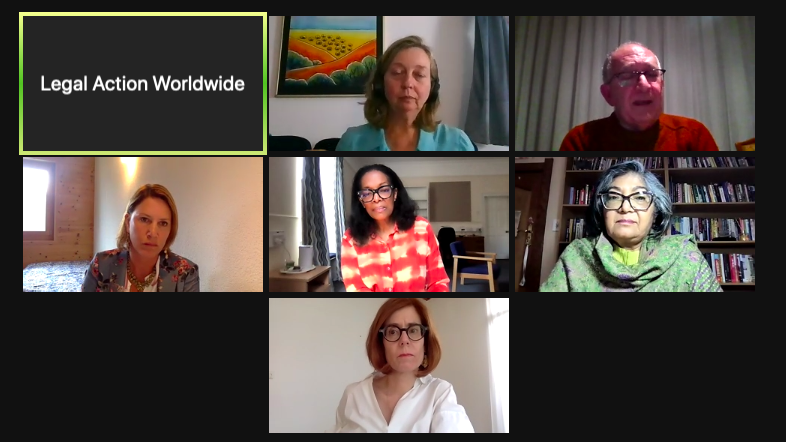Towards Sustainable Justice, Accountability and Returns: The Rohingya crisis into its 4th year
On 6 July 2021, the Embassy of Switzerland in Bangladesh and Legal Action Worldwide (LAW) held an online panel discussion ‘Overlooked and Under Investigated: How to improve our response to conflict-related sexual violence (CRSV) against men and boys, and LGBTQI+ persons.’

The opening remarks were provided by Ambassador Nathalie Chuard, Ambassador of Switzerland to Bangladesh. The event brought together four esteemed panellists:
- Chris Sidoti, member of the Special Advisory Council for Myanmar ( and former member of the Independent International Fact -finding Mission on Myanmar);
- Michelle Jarvis, Deputy Head, Impartial and Independent Mechanism on Syria,
- Yasmin Sooka, member of the Commission on Human Rights in South Sudan; and
- Professor Patricia Viseur Sellers, Special Advisor for Gender for the Office of the Prosecutor of the International Criminal Court.
The event was chaired by Antonia Mulvey, LAW’s Executive Director.
The panel considered national and international responses to CRSV perpetrated against male and LGBTQIA+ survivors, and the links between high quality survivor services and the pursuit of justice and accountability, with a particular focus on the contexts of Syria, Myanmar and South Sudan.
The panellists highlighted that despite growing recognition that men and boys, and LGBTQIA+ persons also experience CRSV, this recognition has not yet translated to changes on the ground for service provision. In her opening remarks, Ambassador Chuard noted ‘There are limitations to current protection services and activities, and having specialised services for men and boys, and LGBTQI+ persons will enable people to speak out.’
Panellists underscored the critical need for greater data on CRSV experienced by male and LGBTQIA+ survivors, as well as increased support and training for those working on this issue. The panellists were unanimous in calling for greater accountability and an end to the widespread impunity for these crimes.
Other critical points raised by the panel included: the need better understanding of sexual violence and gender hierarchies in peace time, which are then exploited in times of armed conflict; the need for defined safe spaces for male and LGBTQIA+ survivors; the need for further work in dismantling barriers and identifying blind spots; that increased support for male and LGBTQIA+ survivors does not require, and must not result in, reduced focus on female survivors of CRSV.
The panel agreed that the international legal and humanitarian communities have only scratched the surface in addressing this important topic.
